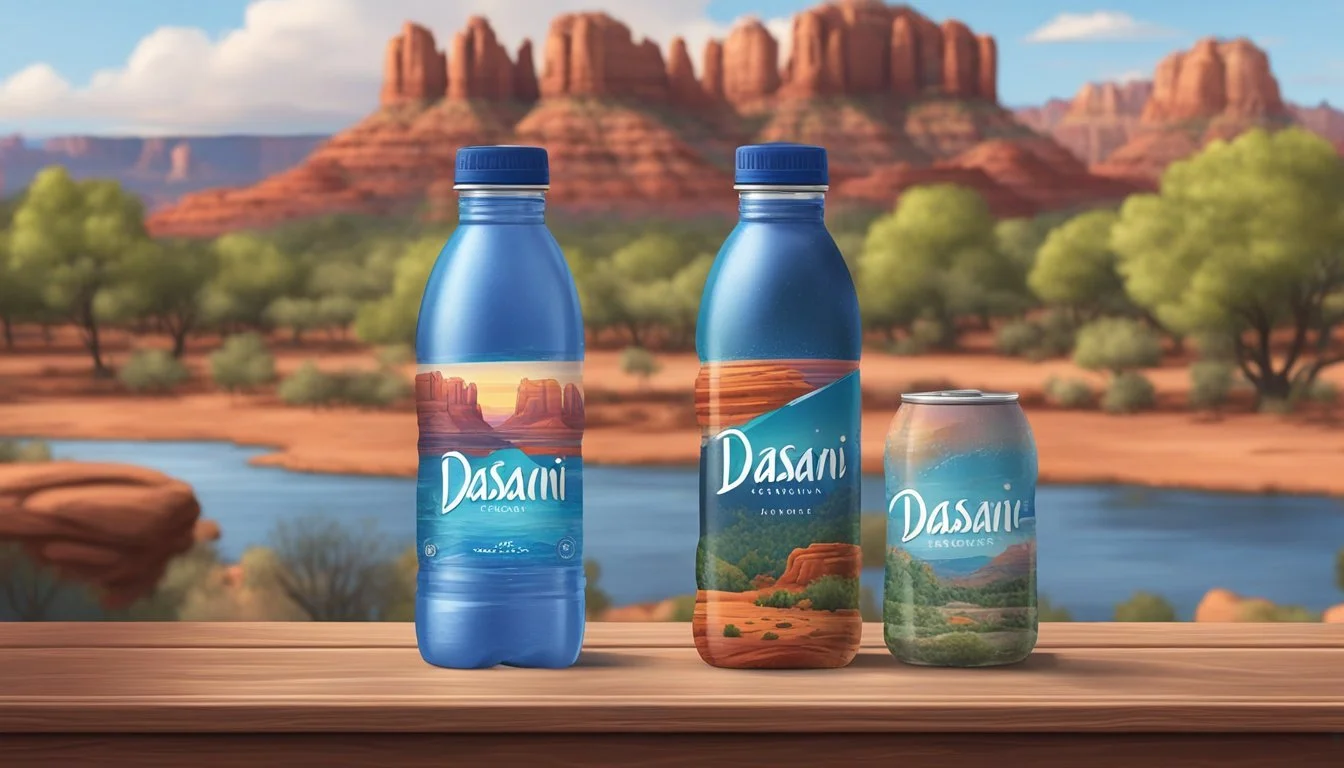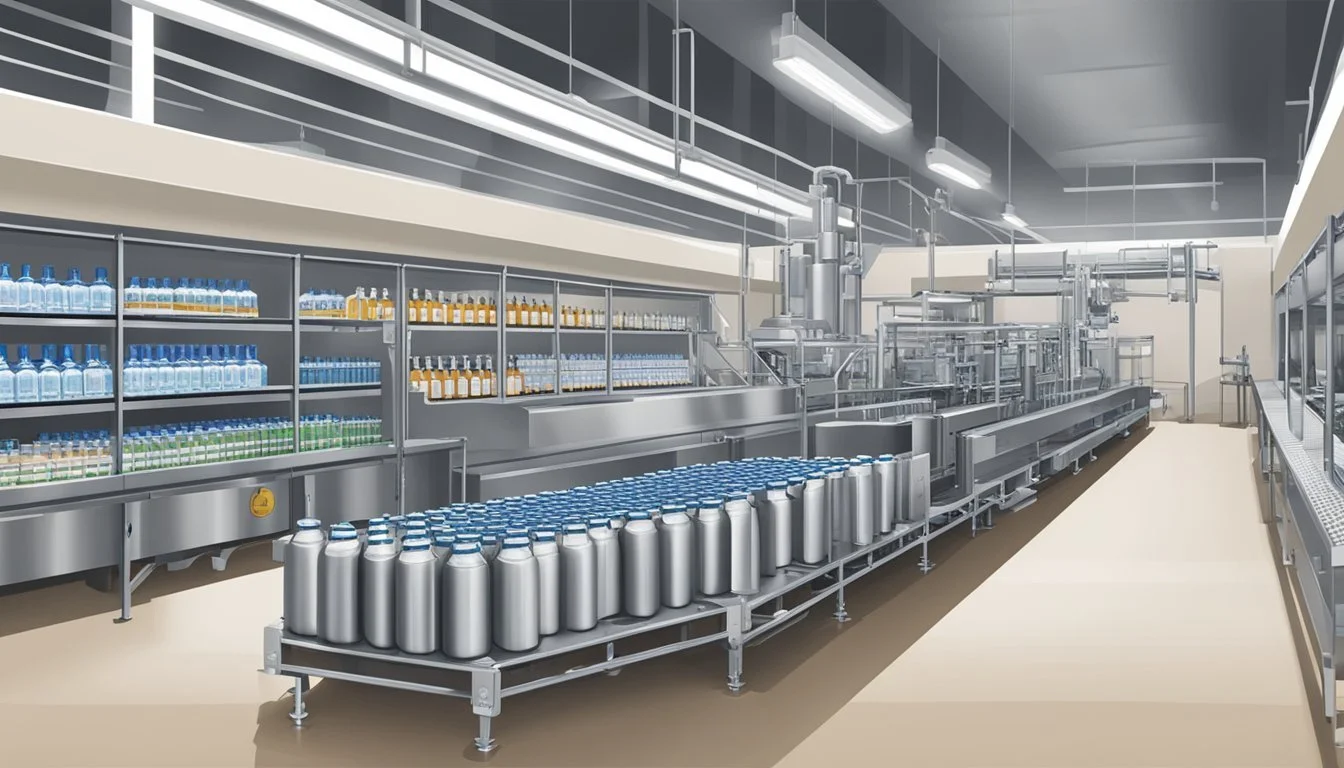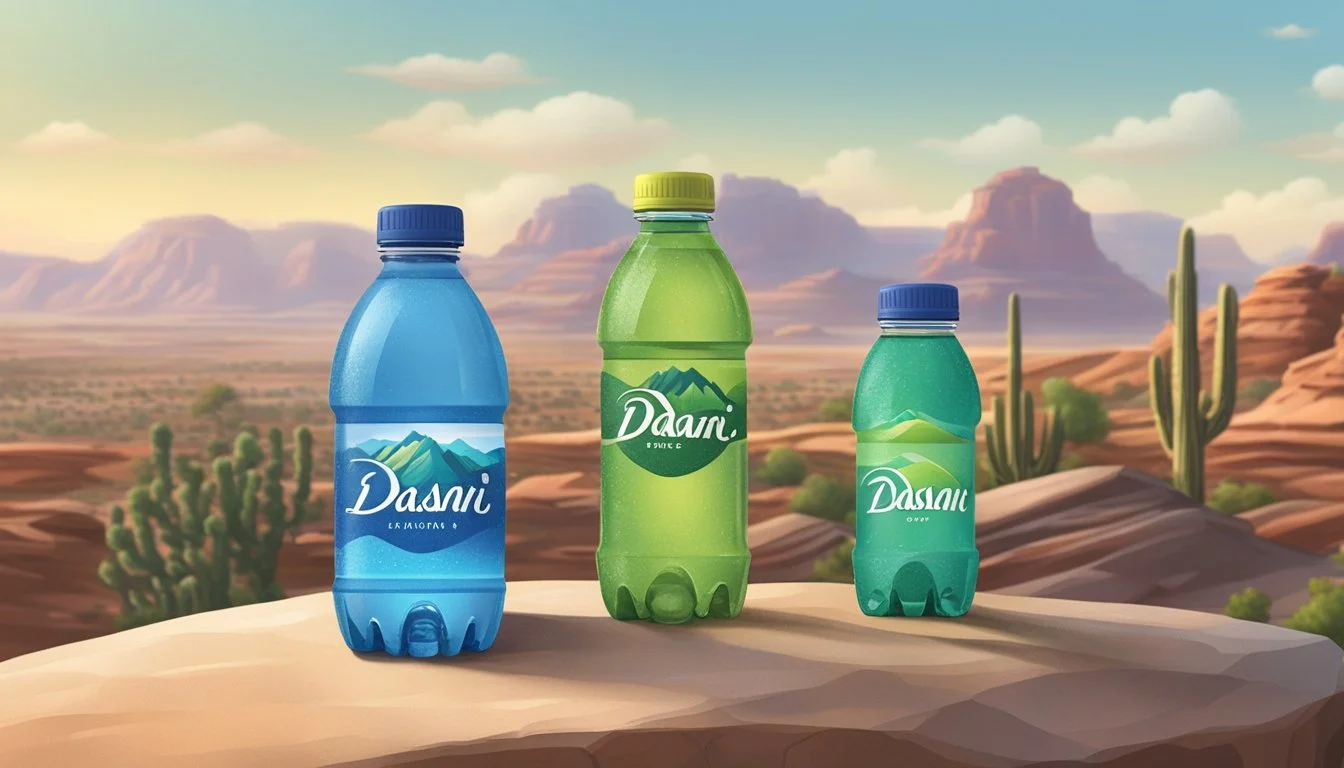Purely Sedona vs. Dasani
Comparing Bottled Water Quality
When it comes to selecting the perfect bottled water, many consumers find themselves choosing between Purely Sedona and Dasani. Each brand offers unique qualities that appeal to different preferences in taste and quality.
Purely Sedona is renowned for its crisp, refreshing flavor and lack of any aftertaste, making it a favorite among those who appreciate a clean and pure drinking experience. On the other hand, Dasani features a distinct mineral flavor due to added electrolytes, which some find more enjoyable and hydrating.
This comparison aims to delve into the specifics of both brands, considering aspects such as source, taste, and quality. By understanding these factors, readers can make a well-informed decision about which bottled water best suits their needs.
Water Source and Origin
Understanding the water source and origin is essential when comparing bottled water brands. Purely Sedona and Dasani take different approaches to sourcing and purifying their water.
Purely Sedona Natural Spring Water
Purely Sedona sources its water from a protected spring in Oak Creek Canyon, Arizona, known for its pristine and natural environment. The spring is nestled in a canyon that ensures minimal contamination from human activities. The water comes directly from a natural spring, which naturally filters it through layers of rock, providing minerals that enhance its taste and health benefits.
Dasani Purified Water
Dasani, a product of the Coca-Cola Company, uses municipal water sources. The water undergoes extensive purification processes, primarily reverse osmosis. This method removes impurities and almost all dissolved minerals. After purification, Dasani adds a proprietary blend of minerals, including magnesium sulfate, potassium chloride, and salt, to create a consistent taste profile.
Comparing Sources: Spring Water vs. Reverse Osmosis
Natural spring water and reverse osmosis water offer distinct advantages. Spring water, such as Purely Sedona, often retains natural minerals that can enhance flavor and provide potential health benefits. Conversely, water purified by reverse osmosis, like Dasani, is free from almost all impurities and contaminants, providing a clean and consistent taste. The choice between these two often depends on consumer preference for natural mineral content versus purity.
Environmental Sustainability of Water Sources
The environmental impact of bottled water sources is a growing concern. Purely Sedona’s reliance on a protected spring in Oak Creek Canyon emphasizes sustainable practices, as it seeks to maintain low environmental disturbances. On the other hand, the use of municipal water sources for Dasani might imply lower sourcing sustainability but benefits from utilizing existing infrastructures, reducing large-scale environmental disruption. However, the bottling and widespread distribution of both brands need to be considered in their overall sustainability footprint.
Health and Content Properties
When comparing Purely Sedona and Dasani bottled waters, it's essential to consider the mineral content, pH levels, potential contaminants, and their overall health benefits.
Mineral Content Analysis
Purely Sedona and Dasani provide distinct mineral content profiles.
Purely Sedona boasts naturally sourced minerals like calcium, magnesium, and potassium. These electrolytes contribute to taste and hydration efficiency.
On the other hand, Dasani water undergoes a purification process and is enhanced with selected minerals, including magnesium sulfate, potassium chloride, and salt. While it lacks the natural mineral variety, these added components aim to replicate a crisp flavor. The type and quantity of minerals in both brands play a pivotal role in their health effects and taste.
pH Levels and Alkalinity
pH balance is crucial in determining the acid-alkaline balance of water.
Purely Sedona's pH level ranges from 7.2 to 7.8, making it slightly alkaline. This range can potentially aid in maintaining the body's pH balance and promoting overall health.
Dasani, with a pH level around 5.6, is comparatively acidic. While it falls within safe drinking water standards, those seeking alkalinity for its purported health benefits might prefer Purely Sedona. Monitoring pH levels not only influences taste but also affects the body's internal pH equilibrium.
Presence of Contaminants
Both water brands adhere to the strict standards set by the EPA and FDA.
Purely Sedona, sourced from protected springs, undergoes minimal processing, preserving its natural purity. It is regularly tested to ensure it’s free from harmful contaminants.
Dasani, a product of Coca-Cola, uses a multi-step filtration process, including reverse osmosis, to eliminate impurities and potential contaminants. While both brands ensure safety, individuals sensitive to processing methods might favor Purely Sedona's natural approach over Dasani's intensive purification.
Health Benefits of Hydration
Staying hydrated with either Purely Sedona or Dasani offers significant health benefits.
Purely Sedona, enriched with natural minerals, can contribute to meeting daily nutritional needs for electrolytes like calcium and magnesium, which are vital for bone health and muscle function.
Dasani's added minerals, though fewer, still support proper hydration and electrolyte balance. Both brands, by providing clean, refreshing water, help maintain bodily functions, support digestion, and contribute to overall well-being. Hydration’s direct impact on health underscores the importance of choosing a suitable water source for individual needs.
Taste Profiles and Water Sommelier Insights
Purely Sedona and Dasani differ significantly in their taste profiles, influenced by mineral content and processing methods. These differences impact consumer preferences and expert opinions in the bottled water market.
The Role of Mineral Composition in Taste
Purely Sedona is a natural spring water known for its balanced mineral composition. This composition includes minerals like calcium and magnesium, contributing to a clean and neutral taste. Its pH level close to 7.0 provides a gentle, crisp profile, making it palatable for regular consumption.
Dasani, on the other hand, is a purified water with added minerals. Typically, Dasani includes magnesium sulfate, potassium chloride, and salt to enhance its taste. These additives impart a slightly more pronounced flavor, making the water taste different from natural options like Purely Sedona.
Market Preferences and Bottled Water Taste Tests
In taste tests, Purely Sedona often appeals to those who prefer a neutral and clean taste. The natural spring source and minimal processing preserve its subtle flavors, favored by many water enthusiasts. Its price point also makes it a popular choice among cost-conscious buyers.
Dasani, however, aims for consistency. The added minerals produce a distinctive flavor that some consumers find refreshing. This consistency caters to a market segment that values reliability in taste, even in highly processed forms of bottled water.
Analyzing Consumer Reviews and Expert Opinions
Consumer reviews highlight the clean and crisp taste of Purely Sedona, with many appreciating its natural origin and neutrality. Expert opinions, including those of water sommeliers, often note its balanced mineral profile and suitability for daily hydration.
Dasani, while polarizing, has a dedicated following. Reviews frequently mention its refreshing quality, though some criticize its taste due to the added minerals. Water sommeliers often point out that the flavor profile of Dasani, while consistent, lacks the subtlety of natural spring waters like Purely Sedona.
This comparison underscores how mineral content, processing methods, and market positioning influence consumer preferences and expert assessments. These factors are crucial for understanding the nuanced landscape of premium bottled water options.
Bottling and Packaging
Examining the bottling and packaging practices of Purely Sedona and Dasani reveals significant differences in their approach to consumer preferences and environmental impact.
Types of Water Bottles
Purely Sedona uses glass bottles, which are considered more environmentally friendly and pose fewer health risks than plastic. These bottles are generally heavier and more expensive to transport, impacting cost and logistics. In contrast, Dasani opts for plastic bottles, which are lightweight and easier to ship but contribute to plastic waste.
Impact of Bottling on Water Quality
Glass bottles used by Purely Sedona are inert, meaning they do not interact with the water, preserving its natural taste and quality. Dasani, which uses plastic bottles, may impart subtle flavors or odors to its water due to potential chemical interactions. Glass is often viewed as superior in maintaining water purity.
Environmental and Health Concerns with Plastic Use
Dasani's reliance on plastic bottles generates significant concerns regarding plastic waste and environmental impact. Plastic bottles contribute to pollution, both from production and disposal. Additionally, plastic can leach harmful substances into the water, posing health risks. Purely Sedona's choice of glass mitigates these concerns, offering a healthier and more environmentally responsible option.
Alternatives: Glass Bottles and Eco-Friendly Packaging
Purely Sedona's use of glass bottles exemplifies a commitment to reducing environmental impact and promoting health. Glass is fully recyclable and does not degrade into harmful microplastics. Meanwhile, Dasani could explore eco-friendly alternatives, such as biodegradable plastics or reusable container options, to reduce its environmental footprint and appeal to environmentally conscious consumers.
These detailed aspects of bottling and packaging highlight the specific choices and consequences of each brand, assisting consumers in making informed decisions.
Branding and Market Positioning
Brand identity and market competition play crucial roles in the positioning of bottled water brands. Both Purely Sedona and Dasani have distinct approaches that influence their market standing and consumer perception.
Purely Sedona and Dasani Brand Identities
Purely Sedona positions itself as a premium bottled water, emphasizing natural purity and the pristine source of its water from Sedona, Arizona. The brand focuses on authenticity and natural aesthetics, appealing to consumers seeking high-quality and environmentally conscious choices.
Dasani, by Coca-Cola, targets a broad market with its affordable, accessible, and consistent product. Its branding highlights purification processes and added minerals for a fresh taste. Dasani capitalizes on Coca-Cola's extensive distribution network, making it widely available.
Market Competition and Industry Leaders
In the competitive bottled water market, Dasani competes with major players like Aquafina and Nestlé Pure Life. Its strong brand recognition and affiliation with Coca-Cola provide significant market leverage.
Purely Sedona, on the other hand, taps into a niche segment focused on premium and natural products. While not as widely recognized as Dasani, it appeals to consumers willing to pay a premium for quality and source purity. This niche positioning helps it stand out in a crowded market.
Competitors like Smartwater and Evian also target health-conscious consumers, but each brand's unique selling points (USPs) ensure diverse options in the market.
Price and Value Proposition
When considering Purely Sedona and Dasani, it is crucial to evaluate both the cost and the perceived value of these bottled water brands compared to tap water. This analysis helps consumers make a more informed choice.
Cost Analysis of Bottled Water Brands
Purely Sedona typically falls in the premium bottled water category, often priced higher than mainstream options. A standard 500ml bottle of Purely Sedona might cost around $2.50.
Dasani, being more accessible, has a lower price point. A 500ml bottle of Dasani generally costs about $1.50.
Comparative pricing:
Brand 500ml Bottle Price Purely Sedona $2.50 Dasani $1.50
In larger quantities, the price gap widens. A case of Purely Sedona could be nearly twice the cost of a Dasani case. Consumers might prefer Dasani for bulk purchases due to its lower cost.
Perceived Value: Premium Bottled Water vs. Tap Water
Purely Sedona markets itself as a premium water choice, emphasizing its source and purity. This often appeals to consumers seeking a high-end option.
Dasani, while not positioned as a premium brand, offers a consistent and reliable product, making it attractive for everyday hydration.
Comparative value:
Purely Sedona: High price reflecting premium quality and source.
Dasani: Affordable, convenient, suitable for regular consumption.
Comparing bottled water to tap water, there is a significant cost difference. Tap water costs a fraction of bottled water prices.
Bottled water's perceived benefits—such as taste, convenience, and perceived purity—drive higher costs. Consumers balancing budget and preference might opt for filtered tap water, which offers cost savings while improving water quality.
Consumer Insights and Personal Choice
Consumers choose bottled water based on taste, brand reputation, and social influences. Platforms like YouTube and social media significantly sway their decisions.
Personal Preferences in Water Selection
Taste is the primary factor driving personal preferences in bottled water. Some consumers find Purely Sedona offers a cleaner, more refreshing taste. Others prefer Dasani’s slightly mineralized flavor.
Quality and source also play crucial roles. Purely Sedona, sourced from natural springs, often appeals to those valuing natural purity. In contrast, Dasani’s reverse osmosis filtration can attract individuals seeking processed and purified options.
Brand loyalty is notable. Long-term users of Dasani might avoid switching due to familiarity, while Purely Sedona appeals through its premium branding.
Influence of Social Media and Online Platforms
Social media and online reviews are powerful influencers in bottled water choices. YouTube reviews often compare brands, highlighting taste tests and consumer feedback. Websites like Reddit and niche forums provide detailed discussions that guide purchase decisions.
Instagram influencers regularly share their preferences and promote specific brands. This visual platform helps shape consumer perceptions and preferences through endorsements.
Brand engagement on social media also plays a role. Companies like Dasani engage with followers through interactive content, while Purely Sedona promotes its natural origins and premium appeal. Influences from these platforms often steer consumer preferences and buying behaviors.
More About Purely Sedona
Aqua Carpatica vs Purely Sedona: Which Bottled Water is Better?
Boxed Water vs Purely Sedona: Which Bottled Water is Better?
Castle Rock vs Purely Sedona: Which Bottled Water is Better?
Core Hydration vs Purely Sedona: Which Bottled Water is Better?
Hawaii Volcanic vs Purely Sedona: Which Bottled Water is Better?
Hawaiian Springs vs Purely Sedona: Which Bottled Water is Better?
Ice Mountain vs Purely Sedona: Which Bottled Water is Better?
Icelandic Glacial vs Purely Sedona: Which Bottled Water is Better?
Mountain Valley Spring Water vs Purely Sedona: Which Bottled Water is Better?
Nestle Pure Life vs Purely Sedona: Which Bottled Water is Better?
Poland Spring vs Purely Sedona: Which Bottled Water is Better?
Purely Sedona vs Cascade Mountain: Which Bottled Water is Better?
Purely Sedona vs Crystal Geyser: Which Bottled Water is Better?
Purely Sedona vs Crystal Lake: Which Bottled Water is Better?
Purely Sedona vs Essence pH10: Which Bottled Water is Better?
Purely Sedona vs Kirkland Signature: Which Bottled Water is Better?
Purely Sedona vs Liquid Death: Which Bottled Water is Better?
Purely Sedona vs Proud Source: Which Bottled Water is Better?
Purely Sedona vs Richard's Rainwater: Which Bottled Water is Better?
Purely Sedona vs Simple Truth: Which Bottled Water is Better?
Purely Sedona vs Talking Rain AQA: Which Bottled Water is Better?
Purely Sedona vs Weird Water: Which Bottled Water is Better?
Purely Sedona vs Whole Foods 365: Which Bottled Water is Better?
Purely Sedona vs Whole Foods Italian Still Mineral water: Which Bottled Water is Better?
San Pellegrino vs Purely Sedona: Which Bottled Water is Better?
Solan de Cabras vs Purely Sedona: Which Bottled Water is Better?
Zephyrhills vs Purely Sedona: Which Bottled Water is Better?








